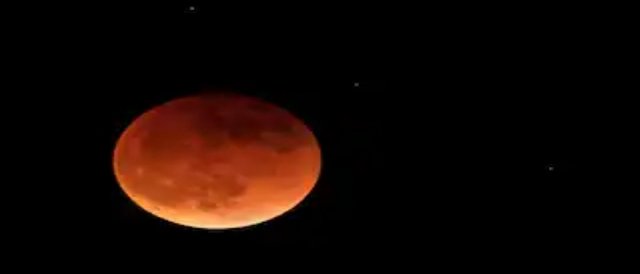A Beaver Blood Moon occurs when the moon passes directly through the Earth’s innermost shadow. During a lunar eclipse, sunlight hitting the Earth’s atmosphere is scattered out. When this happens, the atmosphere filters out most of the blue light. What’s left is a red hue, giving the moon its colour

The Moon will turn blood red today (8 November) and it’s the last chance for star-gazers to witness this spectacular phenomenon until it appears again in 2025.
A total lunar eclipse will be visible across North and Central America, Asia, Australia as well as New Zealand.
Sections
Shows
F.Brands
More
Home
Health
India
World
T20 World Cup
Politics
Arts & Culture
Sports
Tech/Auto
Opinion
Explainers
Entertainment
Cricket
India
World
T20 World Cup
Politics
Tech/Auto
Opinion
Explainers
Entertainment
Cricket
Crypto
Pro Kabaddi
Home Explainers News What Is Beaver Blood Moon? Will India Witness The Last Total Lunar Eclipse Until 2025?
EXPLAINERS
What is Beaver Blood Moon? Will India witness the last total lunar eclipse until 2025?
A Beaver Blood Moon occurs when the moon passes directly through the Earth’s innermost shadow. During a lunar eclipse, sunlight hitting the Earth’s atmosphere is scattered out. When this happens, the atmosphere filters out most of the blue light. What’s left is a red hue, giving the moon its colour
FP Explainers
November 08, 2022 12:41:35 IST
What is Beaver Blood Moon? Will India witness the last total lunar eclipse until 2025?
A total lunar eclipse will be visible across North and Central America, Asia, Australia as well as New Zealand. AP
The Moon will turn blood red today (8 November) and it’s the last chance for star-gazers to witness this spectacular phenomenon until it appears again in 2025.
A total lunar eclipse will be visible across North and Central America, Asia, Australia as well as New Zealand.
India’s Ministry of Earth Sciences has informed that the total phase of the eclipse will be in progress at the time of moonrise in eastern parts of the country like Kolkata and Guwahati.
The next total lunar eclipse will only be visible in March 2025.
Dr Alphonse Sterling, an astrophysicist at National Aeronautics and Space Administration’s (NASA) Marshall Space Flight Centre told CNN, “They aren’t that common, so it’s always nice to get a hold of them when you can. I think they’re excellent learning devices for people who want to get into astronomy.”